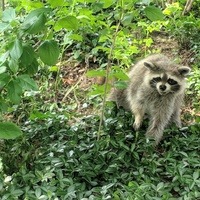So what is the relationship between raccoons in Milwaukee and rabies? Well the viral disease is carried by many of the wild animals lurking in Milwaukee, including raccoons. Wisconsin has not had many cases of infection in human beings in the last two decades (three recorded cases) but that does not mean we get to relax our standards as the threat remains real. As long as infected wild animals are roaming the area, diseases like rabies will remain threats to the human population. Through effective and thorough raccoon removal, Milwaukee homes that are infested by the disease carrying rodents can once again become safe places for families to share.
Raccoons are at risk of both rabies and distemper.Rabies and The Human Body
When rabies infects it targets the central nervous system. The symptoms of a Rabies infection in human beings include:
- Double vision
- Irritability
- Itching or pain at the source spot (where the exposure took place)
- Headache
- fever
If it remains untreated, a rabies infection produces more severe symptoms such as spasms in the throat and the muscles associated with breathing. This then progresses to paralysis and eventually, death. Clearly this is a disease that you want to avoid as best as you can.
Taking Steps to Protect Yourself and Those You Love
Preventing rabies infections means keeping animals like raccoons out of your space. To do this thoroughly, you need the assistance of experts such as Skedaddle’s humane wildlife animal removal team. This is because to the untrained and inexperienced eye, there is little to no difference between a rabid raccoon and a regular one. Additionally, raccoons have behavioural patterns that complicate each removal process. Nursing raccoons, for instance can become quite aggressive when their dens are disturbed. For these reasons experts are needed to deal with raccoons. Attempting to remove raccoons by yourself may therefore put you and your family at greater risk for contracting Rabies and other diseases.
Never approach or interact with a raccoon you think may be infected.Pets and other domesticated animals are sometimes the conduits through which people contract rabies. It is therefore important to have them vaccinated against the virus and to take steps to prevent their interaction with wild animals such as raccoons. Milwaukee citizens who suspect that their pets have been infected should get in touch with a vet immediately.
People who are scratched or bitten by wild raccoons should immediately wash the area thoroughly with lots of soap and water. All cases of suspected human infection must be approached with urgency starting with immediate consultation with medical health care providers. The Wisconsin Division of Public Health has an entire division, the Communicable Disease Epidemiology Section, dedicated to handling potential Rabies infection cases. They may be contacted at 608-267-9003 and for emergency purposes at 608-258-0099.
When in need of assistance with raccoon removal, Milwaukee residents can always rely on Skedaddle. Our team of experts have extensive experience in raccoon behavior and the safe, humane removal of these animals from human environments. They also specialize in preventing raccoon entry to your property.



